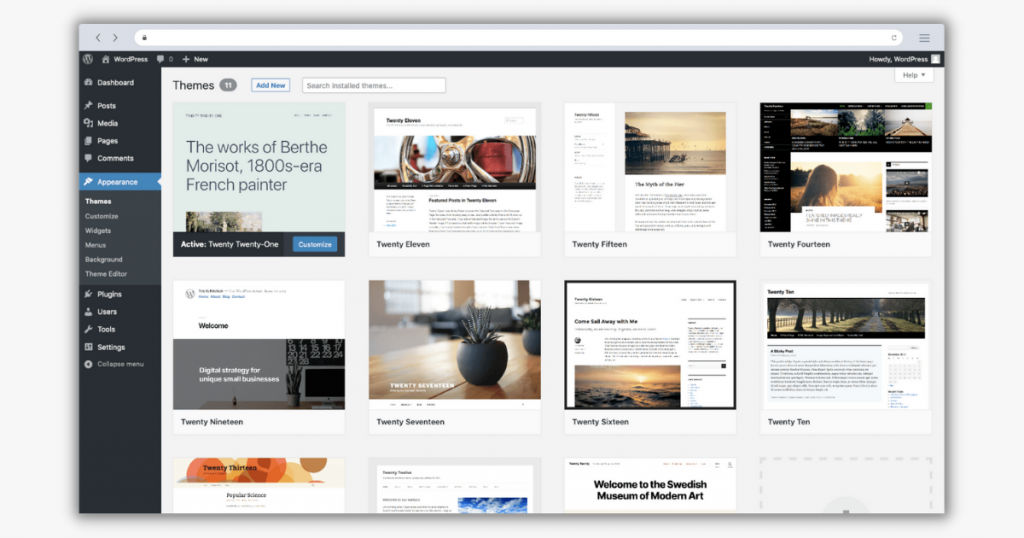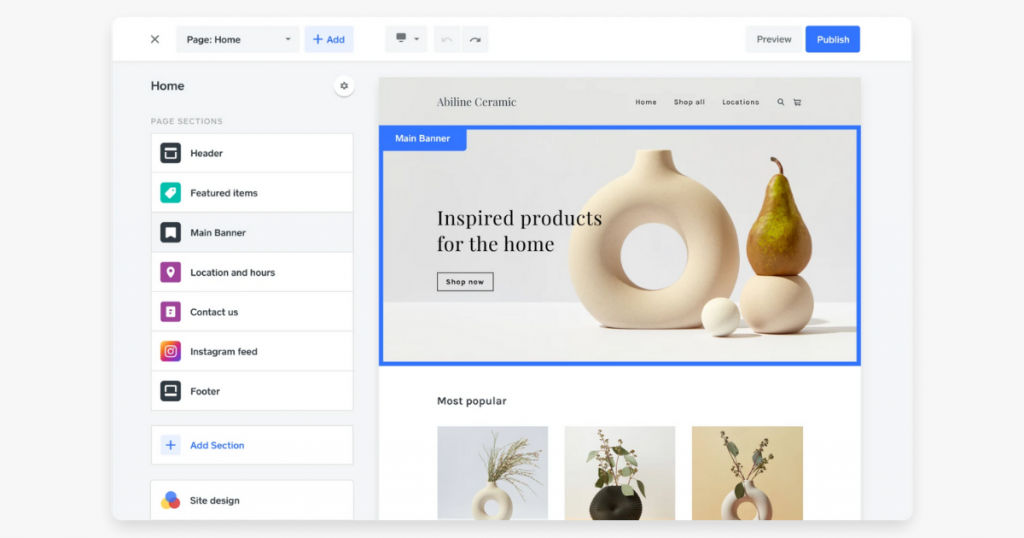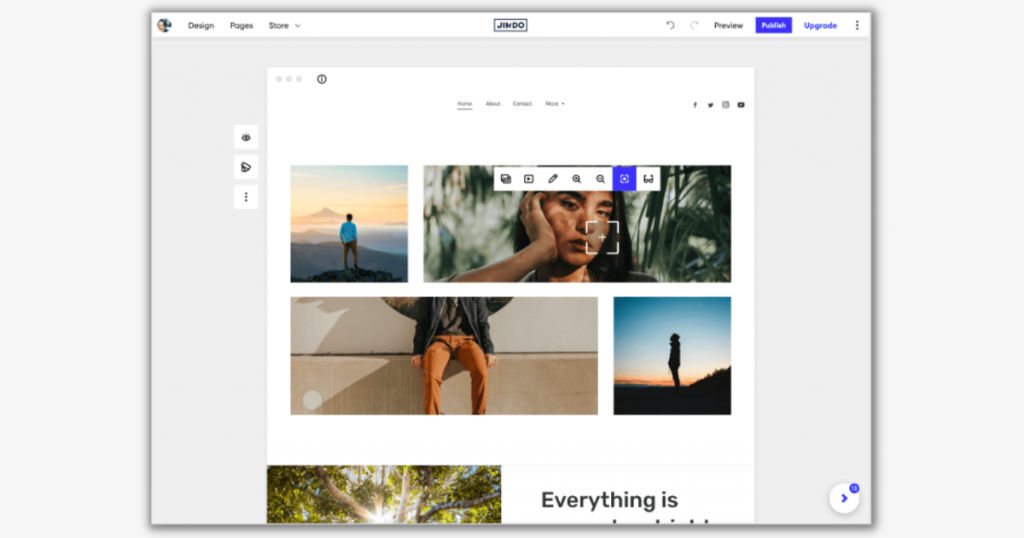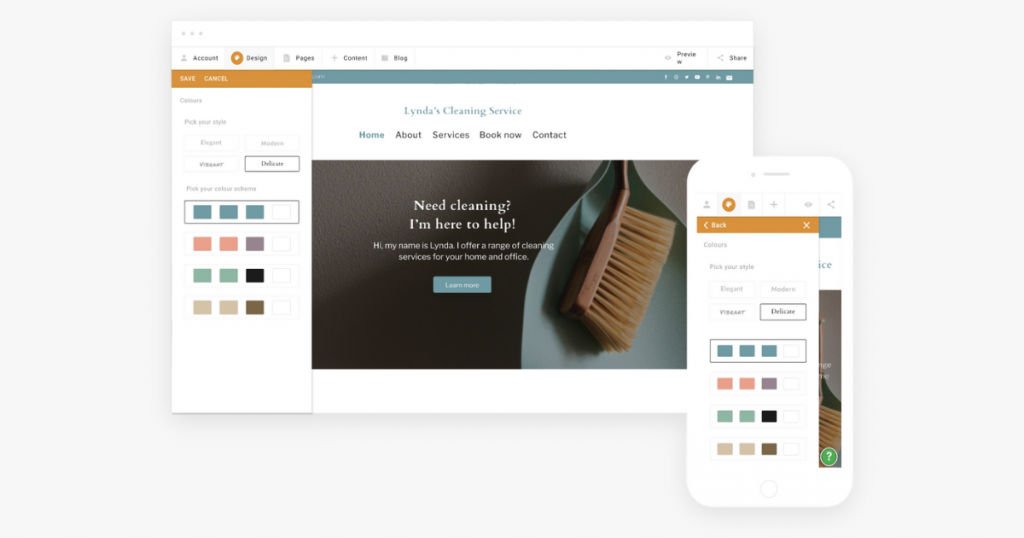
A few years back, developing a website was a professional’s job. Businesses and even individual freelancers would hire experienced designers and coders to create quality websites and landing pages. But today there are advanced tools, known as website builder software, available in the market that even non-professionals can use to create their websites. These tools do not necessarily require manual coding for website development. Users can build an appealing and detailed website in just a few hours by using this software.
In the current scenario, online presence is the key to driving success in business. According to a report, there are more than 1.5 billion websites on the internet today. However, 28% of small businesses still don’t have their own website. There are both paid and free options of website builder tools now available in the market that are suitable for businesses of all sizes but it is recommended for beginners to try a free version of the software before buying the paid plans. This will help them understand the functionality, feasibility, and compatibility of these tools with their needs and make an informed decision.
In this article, we have listed the 5 best free website builder software that can be used in 2021. But first, let’s understand what a website builder software is.
Table of Contents
What is a website builder software?
Website builder software is a tool that helps individual freelancers and entrepreneurs build online websites without manual coding. Using this software, even non-professionals can design a private website for their business. Website builder software can be used as both an online and offline tool. Based on the requirement, users can either login directly to the software server on the web or install the software in their computer systems for offline use. It also provides a user-friendly interface where one can create a website by simply following the step-by-step guide that is mostly available as an in-built feature in most website builder software.
What are the benefits of using website builder software?
Following are the major reasons why website builder software is a must-have tool for all enterprises. It can also benefit individual freelancers in establishing a brand name for themselves.
• Easy-to-use
Website builder software offers an easy-to-use UI. Even people with no technical skillset can easily understand and operate the software. These tools come with drag-and-drop functionality using which one can easily edit the website content with a single click and drag action.
• Cost-effective
It takes both time and expense to hire a professional and get the website designed. And with every update required, one has to go through the same process. This can cost much more over time. Website builder software saves time and expense by offering a straightforward process that even a non-professional can follow and create a website for themselves. There are several free web design software as well that are available in the market that users can try without having to pay any charges.
• Efficiency
Website builder software has an intuitive interface with smart features that allow users to build a website in no time. There are pre-designed templates also available as an in-built feature of this software that further adds to its efficiency. These templates can be easily modified based on the user’s requirement without having to change the code and undergo the FTP process. Users can add brand-specific colors, logos, and style in just a few clicks to make it personalized.

• Mobile compatibility
Users can access website builder software directly on the web or they can also install it on their computer system. This software also comes with mobile compatibility that allows users to operate the software even from remote locations. Hence, it is suitable for the distributed workforce as well. Anyone with the user address and login details can make changes in the website design and content.
• eCommerce integration
Website builder software comes with eCommerce integration. So, users can directly catalog their products for sale on their website. With the in-built eCommerce tools, users can create personalized online stores in just a few steps. They can also upload and manage product profiles online based on their business needs.
What should users look for in a website builder software?
Following are the key features that should be offered by website builder software to achieve optimal performance. These features are essential for a smooth website designing experience. They are also scalable features that make them suitable for businesses of all sizes.
- Pre-formatted layout
- In-built customizable templates
- eCommerce compatibility
- WYSIWYG editor
- Product cataloging
- Social media support
- Performance analytics and reports
- Email support
- Blogging tool
- Intuitive UI
- Form builder
- SEO management
- Landing page template designs
- Drag and drop functionality
- Survey support
- Content export/import
- Online store builder
- Domain registration support
Which are the best free website builder software in 2021?
Mentioned below are the 5 best free website builder software available in the market in 2021. These are well suited for businesses of all sizes.
1. Wix

Wix is a powerful website builder tool with smart features and robust customization options. It has an intuitive UI with an integrated web builder that provides users with multiple customizable web page templates. Users can create professional websites for their business in no time without having to go through FTP protocols and make coding changes. The registration process is also very simple. Users can sign up on the Wix platform with just their email ID and avail all its features.
Wix is an all-rounder website builder tool. It is equipped with features like drag and drop functionality, easy-to-follow wizards, and a widget menu that makes website designing a smooth and efficient process. Users have complete control over the content and design that goes on the website. They can drag and add images, text, videos, and more on the webpage.
Wix offers cloud storage of up to 500MB for each of its users. Digital components of the website like eCommerce media, animations, and videos that are a part of the website can be stored on Wix servers for reference or recovery whenever needed. Wix also offers Intuitive editor x Interface functionality for content management solutions. Wix is utilized by all kinds of creators, be it photographers, musicians, influencers, dancers, freelancers, or restaurant owners.
The key features of Wix include the following –
- Advanced customization options
- Third-party integrations and add-ons
- Intuitive UI
- Easy-to-use
- Data security
- Cloud-based
- Built-in image editor
- Social media support
- SEO management
- Newsletter management
- Online booking
- Pre-designed templates
- Drag and drop functionality
- Online store builder
- Content Import/export feature
- eCommerce compatibility
- WYSIWYG editor
- Domain registration
Technical details
| Customer support | Online customer support available during business hours |
| API integration | Yes |
| Deployment | Web/Cloud, Mobile phones – Android/iOS |
| Scalability | Suitable for freelancers, large enterprises, medium enterprises, and small businesses |
| SW score | 98% |
Pros and cons
| Pros | AI-based Intuitive Editor X interface support for best user experience. Freemium plans are available without any charges. |
| Cons | Cannot remove ads even in the paid starter plan. |
Pricing
Wix offers a freemium subscription plan that offers advanced website designing and editing features with absolutely no charges. It is the best plan for beginners to start with website designing. Wix also offers a free trial for all its subscription plans that start at $14/month.
2. WordPress

WordPress is another drag-and-drop website builder software. It is extensively utilized by bloggers for sharing blogs, articles, and other pieces of writing. It is a free platform with powerful tool integration that offers a simplified web designing experience. WordPress is the most popular tool in the market today. According to a report, 40% of the websites in 2021 are powered by WordPress.
WordPress is an open-source-based website builder tool. It offers up to 3GB of online storage space for all of its users. It also offers multiple third-party integrations and more than 54000 free plugins that allow users to add a variety of content and external links to their website. There is a WooCommerce version of WordPress that allows users to integrate eCommerce platforms on their websites. It also supports more than 196 languages that make it stand out in the market competition.
There are two types of WordPress software. One is WordPress.com and the other is WordPress.org. WordPress.com supports blogging features and can also be used as a website builder software whereas WordPress.org is majorly a content management system (CMS). So, users should access their needs before choosing one of the above-mentioned WordPress platforms.
The key features of WordPress are as follows –
- Easy-to-use
- User friendly
- Intuitive UI
- The in-built automated error detector
- Cloud-based
- Online data storage
- Pre-designed templates for landing pages
- SEO management
- Content import/export feature
- WYSIWYG Editor
- Drag-and-drop functionality
- Blogging tools
- Auto updates
- eCommerce compatibility
- Survey support
- Approval process control
- Version control
- Indexing
- Document management
- Built-in image editor
- Social media support
- Domain registration
Technical details
| Customer support | Online customer support |
| API integration | Yes |
| Deployment | Web/Cloud, Mobile phones – Android/iOS, desktop – Windows/Mac |
| Scalability | Suitable for freelancers, large enterprises, medium enterprises, and small businesses |
| SW score | 95% |
Pros and cons
| Pros | Inexpensive software. Free version available with advanced features. Mobile phones compatibility allows remote accessibility. Excellent blogging tool. |
| Cons | WordPress can undergo frequent updates that make it difficult to operate. |
Pricing
WordPress offers an SSL-certified freemium plan that offers a jetpack of essential blogging tools and pre-built template designs without any charges. It also offers a free trial on all its paid subscription plans that start at €4/month.
3. Weebly

Weebly is a high-quality website builder tool. It can be used for creating professional-looking websites for businesses of all scale operations. It comes with in-built tools for creating visual stores linked to the website that seamlessly integrates with eCommerce platforms as well.
Weebly offers a step-by-step guide for website designing along with multiple options of pre-designed templates. Users can simply follow the instructions and start the website designing process. Weebly also has integrated marketing tools that are capable of executing performance analysis. It generates analytics reports that can be used by the users to optimize their website design for maximum output.
The drag and drop functionality of Weebly allows users to add or edit website content in just a few clicks. Users can add a variety of media content to their website including images, animations, videos, and more. With Weebly website builder software, users can also carry out email marketing. Users can schedule automated emails for improving brand visibility, product promotions, feedback, and follow-ups.
Weebly comes with an in-built payment gateway support that seamlessly integrates with business operations. It also helps the users manage sales on their website and its linked online stores. Weebly is a part of the Square product suite that acts as a point-of-sale system. It automates all the transactions, and also maintains a payment record. Users can use this database as a reference during ITR filing and audits.
The key features of Weebly include the following –
- Website customization tools
- SEO management
- Online booking
- Pre-built templates
- Auto-save functionality
- eCommerce integration tools
- Newsletter management
- Drag and drop functionality
- WYSIWYG Editor
- Intuitive UI
- Easy-to-use
- Cloud-based
- POS integration
- Payment gateway integration
Technical details
| Customer support | Online customer support during business hours |
| API integration | Yes |
| Deployment | Web/Cloud, Mobile phones – Android/iOS, desktop – Windows/Mac |
| Scalability | Works well for freelancers, large enterprises, medium enterprises, and small businesses |
| SW score | 92% |
Pros and cons
| Pros | Excellent customer support Smart features that offer automated template selection Cloud storage up to 500MB |
| Cons | Limited blogging tools |
Pricing
Weebly offers freemium plans with SSL-based data security, domain branding, search engine optimization, chat and email support, community forum, and more. It also offers a free trial for all its subscription plans that start at $5/month.
4. Jimdo

Jimdo is a straightforward solution for website designing. It offers a set of powerful tools that helps users create a personalized website in just a matter of a few minutes. Jimbo offers an intuitive interface with an in-built AI-powered virtual assistant. At the time of registration, Jimdo asks a set of questions, and based on the answers and information collected, the software automatically provides a pre-designed web page that will best suit the user’s requirement. Users can further edit the content and customize the website according to their likes and preferences.
Beginners can also take the help of the step-by-step guide offered by Jimdo. They can simply follow the defined process to get the website designing started. Jimdo also provides additional tips and tricks to enhance the website quality. In addition, Jimdo provides flexible content blocks that are ready to use.
Following are the key features offered by Jimdo –
- Website customization tools
- eCommerce integration tools
- Newsletter management
- Pre-built templates
- Auto-save functionality
- Drag and drop functionality
- Auto-updates
- WYSIWYG Editor
- Intuitive UI
- SEO management
- Online booking
- Easy-to-use
- Cloud-based
- POS integration
- Payment gateway integration
- Domain registration
Technical details
| Customer support | Online customer support |
| API integration | Yes |
| Deployment | Web/Cloud, Mobile phones – Android/iOS |
| Scalability | Well-suited for freelancers, large enterprises, medium enterprises, and small businesses |
| SW score | 91% |
Pros and cons
| Pros | Unlimited cloud storage on business plans Straightforward software operation AI-powered virtual assistant |
| Cons | SEO optimization tools are only available for paid plans |
Pricing
Jimdo has a freemium plan that offers all the basic features required for website designing. Other paid subscription plans start at $4/month.
5. SimpleSite

SimpleSite is a straightforward website builder software. It is also one of the best free website builder software for beginners. It offers a set of simple steps along with a guide to help beginners design their website in no time. It also offers an in-built web page editor that allows users to modify website content according to their preferences.
The major advantage of SimpleSite website builder software is that it is compatible with mobile devices allowing users to access and websites even from remote locations. It should be noted that SimpleSite can be used to create a basic website as it does not support many of the advanced features that are offered by other software in the field. As the process goes, users can register on the platform, choose a basic template including color, title, images, and domain name, and proceed to publish the website. However, users can always go back to customize it further.
Key features of SimpleSite include the following –
- SEO management
- Easy-to-use
- Drag and drop functionality
- Mobile phones compatibility
- Content Import/Export feature
- Online store builder
- WYSIWYG Editor
- Pre-designed templates
- Product cataloging
- Social media support
- Form builder
- Performance analytics and reports
- Email support
- Intuitive UI
Technical details
| Customer Support | 24X7 live online customer support |
| API integration | Yes |
| Deployment | Web/Cloud |
| Scalability | Suitable for large enterprises, medium enterprises, and small businesses |
| SW score | 88% |
Pros and cons
| Pros | Straightforward operation Best for beginners Mobile device compatibility |
| Cons | Limited functionality and customization options |
Pricing
SimpleSite has a freemium plan that offers features like domain registration, website template designs, unlimited video minutes, premium support, and more absolutely free of cost. Advanced paid subscription plans are also available that start at $11.25/month.
Conclusion
Websites help businesses increase their audience reach by multi-folds. Given the current scenario, online presence has also become essential to keep the business running. Previously, it was considered a professional’s job but with website builder software it is now possible even for non-professionals to create a private website in no time.
In this article, we discussed the 5 best free website builder software suitable for businesses of all sizes. One should give them a try if they are starting their journey in website designing. In case you wish to explore more, kindly visit us at SaaSworthy.
Also read:
• 7 Top Property Management Software to Help Run Your Real Estate Business Smoothly



![10 Best Free and Open-Source Landscape Design Software in 2024 [Updated] SaaSworthy Blog Header](https://images.saasworthy.com/blog_latest/wp-content/uploads/2021/04/Blog-Header-Image.png)


